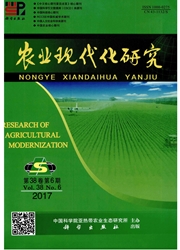

 中文摘要:
中文摘要:
基于甘肃省87个县区的统计数据,构建粮食可持续生产能力评价指标体系,运用因子分析法对其进行综合评价和分析,并依据聚类结果划分为5种空间类型;采用耕地变化强度指数、相对粮食承载指数和探索性空间数据分析技术,定量评价了甘肃省县域粮食可持续生产能力的时空差异。结果表明:甘肃省粮食可持续生产能力的县际差异较大,强可持续生产能力型县区全部位于河西走廊干旱内陆河流域;县域粮食可持续生产能力与经济发展和农民人均收入的地域格局呈现出显著的空间差异化特征和俱乐部趋同态势。研究结果可为促进区域粮食综合生产能力提供较为科学的依据。
 英文摘要:
英文摘要:
Based on the statistical data of 87 counties in Gansu Province,the comprehensive assessment index system of grain sustainable production ability was established.Basic characters and regional differences of grain sustainable production ability in Gansu Province were comprehensively examined by using the technique of factor analysis,and five spatial types were classified according to the results.Quantitative evaluation of the temporal and spatial differences in grain sustainable production ability in Gansu Province was carried out by using cultivated land change intensity index,relative grain load index and exploratory spatial data analysis technique.Results indicated that grain sustainable production ability in Gansu Province differences in inter-county,and strong sustainable capacity-based counties are all located in arid inland river basins in the Hexi Corridor.Geographical pattern of economic development,farmers per capita income and the grain sustainable production ability show a significant spatial differentiation characteristics and club convergence trend.The purpose is to provide more scientific basis for improvement of grain comprehensive production ability.
 同期刊论文项目
同期刊论文项目
 同项目期刊论文
同项目期刊论文
 期刊信息
期刊信息
